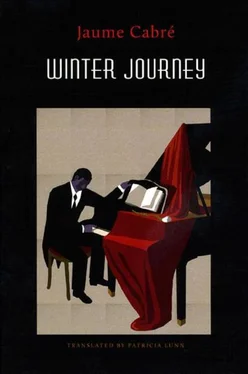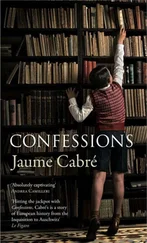The truck, in a caravan of eight or ten vehicles, disgorged dozens of terrified people onto Stawki Street, at the corner of Dzika, where a cattle train was waiting. It departed promptly, leaving the ghetto behind and passing through silent Warsaw, which was trying to look the other way, crossed the Vistula and left the city in the direction of Wolomin and Tluszcz, headed for the happy summer town of Treblinka.
They didn't strip or shave them like the others. They only locked them up with another family from their street in a room that was small, dark and very cold, with windows they hadn't even bothered to put bars on, because the jailers knew they were no longer people and had lost their survival instinct along with their dignity. And they forgot about them, as if they were so busy with the other hordes that they had no time. Or as if they didn't know what to do with them.
They spent the day in silence, their eyes wide, sitting against the wall looking towards the weak light coming in through the dirty windows. And hearing from time to time the vicious barks of the SS officers and the coarse laughter of the Ukranian volunteers. After they opened the door for the first time, to leave some crusts of moldy bread and a jar of dirty water, Doctor Lodzer reacted. He and Mr. Langfus, a jumpy old man who had lost his fabric store on Senatorskaia Street when he was interned in the ghetto, organized life in that burrow with the desperate knowledge that they had no choice but to recognize that once the thing had begun, they were inside a fateful circle, which was getting smaller day by day, and they were trying to adjust to it, giving thanks to God for his goodness, and the circle was getting even smaller until one day they wouldn't be able to praise the Lord because the circle would be as small as death. Meanwhile, though, they were surviving by thinking, by deciding that the back corner would be the latrine, that Ruth Langfus would divide the crusts into equal parts, that any adult who wasn't crying would tell stories to the children for an hour every day. But Miriam didn't participate in the desperate attempt to organize the shrinking circle where they'd been confined. She spent the days with Edith in her arms, trying to bring down her fever by looking at her or by passing her hand over her forehead, and telling stories just for her, stories that reminded her of the happy days on lerussalimskaia Street, when she was a child who loved to hear her mother's stories. Now she had to tell them so her little girl would have a reason not to die at the age of six. Miriam thought she'd like to give her all her blood so that she would survive, so that she and ltshak would survive.
After a week, a sullen corporal entered followed by a Ukranian soldier. He swore at the stink in there and called for the Langfus family. Like silent automatons, Stanislaw Langfus and his family got organized, grandparents mixed with children, but all in line. They left without saying goodbye, without turning their heads to look at the Lodzers one last time, so as not to infuriate the Nazi dogs. Langfus had time to hand to Miriam the wedding ring he'd been able to hide from the search to which they'd been subjected as soon as they reached Treblinka. And the Lodzers were alone, accompanied only by ltshak's little cough, which had narrowed the circle around them. And two more days of silence, wondering what had become of the Langfus family, what had become of Grandfather Stanislaw, with his blue eyes and his rolled-up sleeves, of his granddaughter Ruth, and his son-in-law and the three little ones. And everyone, except for ltshak and Edith, knew that the happy district of Treblinka had become the end of the line which they would leave only by flying up to the gray sky through the stovepipe, through the sinister tube of the chimney, as if they were a dream. They knew it but they couldn't believe it, because it was impossible that reality should be so obscene. When four days had gone by without news of the Langfuses, they understood that they would never see them again, and fell into a thick, dull silence of oblique glances, broken only by the songs that Miriam sang very sweetly to put the little girl to sleep, because she wanted her to spend the days sleeping so as not to experience that horror.
"Everybody up! Josef Lodzer!"
They'd rammed open the door, making it bang against the wall, and Edith, who'd just fallen asleep, woke up with a start but didn't even whimper because, though only six, she'd learned to keep quiet and hide her panic inside. The only thing she did was clutch her mother's hand.
"I'll be right back," the doctor said, to calm them. As he left, he looked tenderly at the grandfather, sitting in his corner, and the two children and Miriam, to take the memory of them to eternity.
"I'm sorry,' said ltshak, who was still thinking about his cough.
"If you survive," the doctor whispered to them, "go to Palestine." And he disappeared, in front of the dogs.
The Hauptfuhrer of the SS was accompanied by a thin, bald man with glasses who scrutinized Dr. Lodzer's face in order to observe his reaction to the proposal made to him.
"And what guarantee do 1 have that you'll keep your word?" he dared to ask.
"None. But I'm afraid you have no choice."
Accustomed to obeying, Dr. Lodzer bowed his head. In a voice of deepest sorrow, he asked:
"Who will live?"
The bald man spoke for the first time, with cultured politeness:
"That you will have to decide," he smiled sympathetically and finished the sentence, "among yourselves."
As he left, the doctor broke the rules of Treblinka by looking with hatred into the eyes of the Hauptfuhrer and the bald man. God does not exist, he thought as they took him back to the cell.
Josef Lodzer talked with Miriam and the grandfather when the two children were sleeping. They had two hours to think about it and come to a decision. The two men allowed Miriam to cry bitterly over such impossible cruelty. When she calmed down, the grandfather insisted on reciting the ekah, as he had been doing daily since death was so close, and he recited, Remember, Jerusalem, the days of your affliction. And Miriam, her voice broken with sorrow, murmured, My soul is far from peace; now I do not know what happiness is. And Dr. Lodzer, his lips stiff, spat, My strength and my hope in Adonai have ended. He said it with such harshness that his praying of the ekah sounded like blasphemy. So that these should not be the last words of believers, the grandfather added, almost unintelligibly, Grant them, Lord, a hard heart; may that be their curse, oh, Adonai.
ltshak Lodzer felt a chill and wrapped himself in the blanket given to him by the dark-eyed girl named Hannah whose smile was like a benediction. He touched the cold barrel of the rifle and looked into the disturbing darkness. The silence of danger, fed by his own silence. All of a sudden, without warning, he had to cough. He couldn't help it. And the sound horrified him and he said, Sorry, sorry…, like a prayer. And in a flash he saw himself in Treblinka, suffering the pain of cruelty, his fault, because it was his fault that Edith and Mother, Grandfather and Father had died. And now who knows where they were, maybe blown by the wind as far as the steppes, or deposited on the ground in a moment of calm. My dear ones, 1 killed you because of my cough. Even though at Raman Gat they'd taught him to forget, to erase the guilty cough from his head. The tears froze on his cheek and he pulled the blanket closer. And he saw himself with his mouth open, at the port of Haifa, holding the hand of an unknown immigrant who'd been his father, mother, sister and grandfather during the journey, and who left him at the door of the Ramat Gan Reception Center. ltshak Lodzer, twelve years old, born in Warsaw, son of Josef Lodzer and Miriam, brother of sweet Edith, grandson of Moishe Lodzer, of the Mattes family of Lodz, and therefore an eleventh-generation descendant of the great Rabbi Chaim Mattes, permanently at odds with God in spite of it all. He'd gone to Palestine in obedience to his father's last wish, along with a wave of the participants in the first aliyah bet who defied the authorities of the protectorate of Palestine and brought in those who wanted to flee in whatever way, at whatever cost, from the Europe still covered in the ashes and smoke of their brothers and sisters. For six years, in Ramat Gan, they helped him to forget, they made him vomit up the demons, and got him to sleep almost all night long, and almost stopped his pupils from fluttering and his facial muscles from twitching. They made him some very thick glasses, too thick, because his vision was aged by the horrors he'd seen. They did all that, and made him learn Hebrew and teach a few words of Yiddish to his fellow students from the Magreb, and learn Arabic and smile once in a while. But they couldn't erase the memory of that small, dark, very cold room in Treblinka.
Читать дальше












